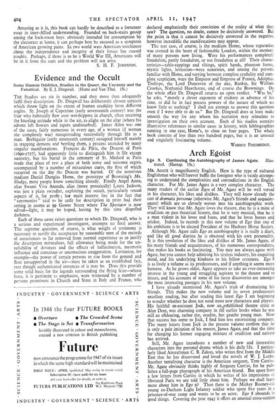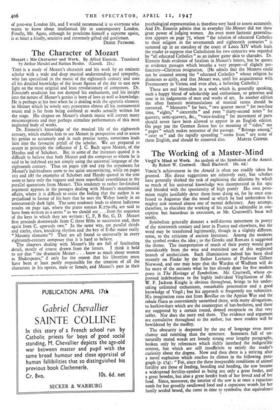Arch Egoist
Ego 8. Continuing the Autobiography of James Agate. Illus- trated. (Harrap. 15s.) MR. AGATE is magnificently English. Here is the type of cultured Englishman who will forever baffle the foreigner who is vainly attempt- ing to understand the complexities and contradictions in the English character. For Mr. James Agate is a very complex character. The many readers of the earlier Egos of Mr. Agate will be well versed in his character, his likes and dislikes. They will know already the cast of dramatis personae (otherwise Mr. Agate's friends and acquaint- ances) which are so cleverly woven into his autobiographic work. They will know that Mr. Agate loves the theatre, that he is a mine of erudition on past theatrical history, that he is very musical, that he is a man violent in his loves and hates, and that he loves horses and cricket. Indeed, he records in this new volume of Ego that one of his ambitions is to be elected President of the Hackney Horse Society. Although Mr. Agate calls Ego an autobiography it is really a diary, and like all good diarists he is obsessed with his own personality. It is this revelation of the likes and dislikes of Mr. James Agate, of his many friends and acquaintances, of his numerous correspondents, that makes his books so fascinating. You may not always agree with Agate, but you cannot help admiring his tireless industry, his enquiring mind, and his underlying kindness to his fellow creatures. Ego 8 is as lively a volume as its predecessors, and-if anything it seems more humane. As he grows older, Agate appears to take an ever-increasing interest- in the young and struggling aspirant to the theatre and to letters, and his accounts of some of his latest discoveries are amongst the most interesting passages in his new volume.
I have already mentioned Mr. Agate's trick of dramatising his friends. This makes the new volume and its seven predecessors excellent reading, but after reading this latest Ego I am beginning to wonder whether he does not need more new characters and players. His faithful ex-assistant Jock, now an.,egablished theatre critic as Alan Dent, was charming company in thl earlier books when he was still an endearing, rather shy, erudite, but gauche young man. Now that success has come to Jock, I find him less entertaining company. The many letters from Jock in the present volume confirm that he is only a pale imitation of his master, James Agate, and that the time for changing his former engaging mixture, of erudition and naivete has arrived.
Still, Mr. Agate introduces a number of new and interesting characters into the personal drama which is his daily life. I particu- larly liked Aircraftman C. B. Zakon, who writes first from the Middle East that he has discovered and loved the novels of W. J. Locke. Another tantalising character is the American sergeant, Tom Curtiss. Mr. Agate obviously thinks highly of Sergeant Curtiss, for he pub- lishes a full-page photograph of his American friend. But apart from a few letters from Curtiss in which he writes of his impressions of liberated Paris we are told little about him. Perhaps we shall learn more about him in Ego 9? Then there is the Mickey Rooney-ish young ex-Durham Light Infantry soldier who spent five years in a prisoner-of-war camp and wants to be an actor. Ego 8 abounds in good things. Covering the year 1945 it offers an unusual cross-section of post-war London life, and I would recommend it to everyone who wants to know about intellectual, life in contemporary London. Finally, Mr. Agate, although he proclaims himself a supreme egoist, is at heart a kindly, sensitive and extremely gifted old gentleman.
DEREK PATMORE.



































 Previous page
Previous page